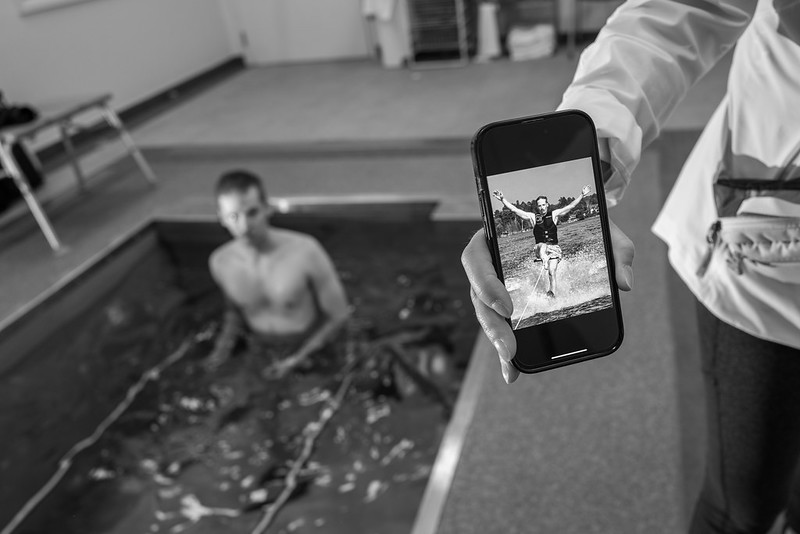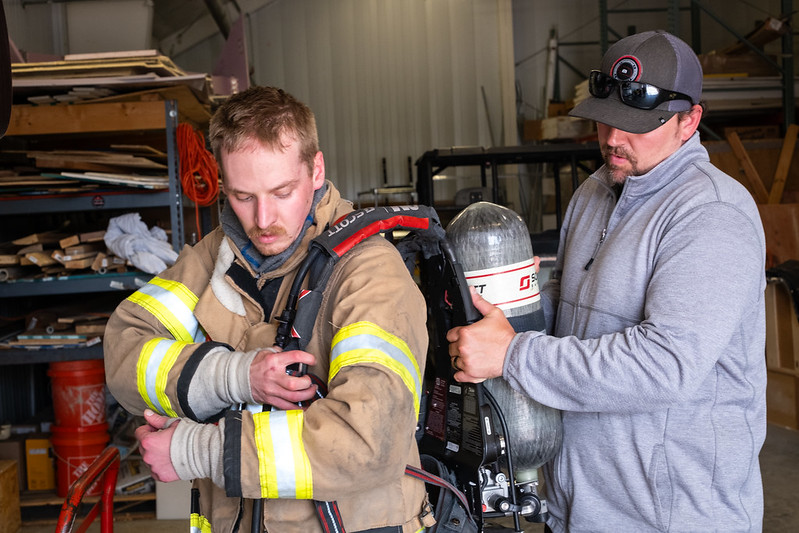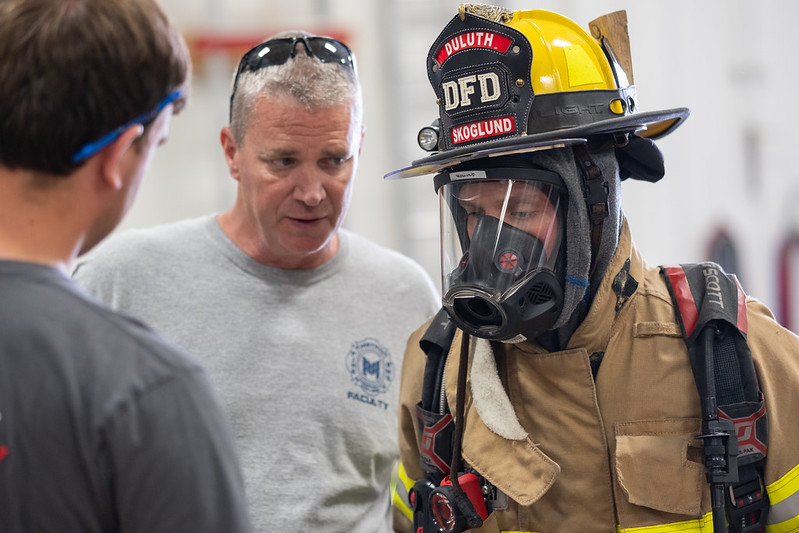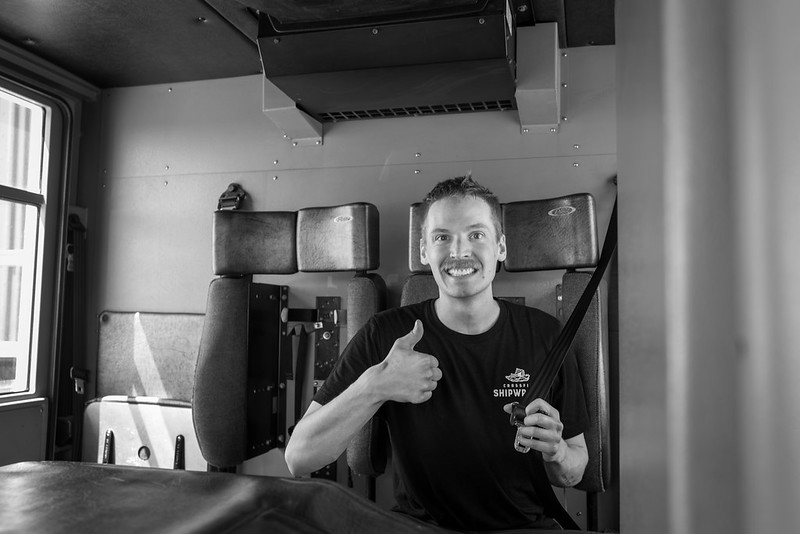A Life Marked by Service and Dedication
It started as a simple idea. He’d get introduced to a local fire chief. He was eager, ready. By the time he left the firehouse and got a feel for what the job might look like, all the tasks from the drudging to the immense, Ray Skoglund knew it was the path for him. And so he pursued it. The profession was, for him, a dream.
He wasn’t in it for the schedule, the 24-hour shifts every other day for four cycles followed by a six-day weekend. He wasn’t in it for the accolades. He did it for the people of Duluth, Minnesota. He jumped at the chance to serve this community he grew up in, was a part of, and loved.
“I enjoy helping people,” he says, “and the job has an active lifestyle.” It’s a cliché, sure, to say that Ray is a go-getter, but he fits that moniker perfectly, if not transcending it along the way.
A Sudden Change
In early 2024 he was set to compete in a marathon. At the age of twenty-four, he was in the prime of his life. When the hit and run accident happened and a brain injury resulted, Ray wouldn’t let it get the best of him. In his mind, there was only one future ahead of him: a return to firefighting. It’s one thing to believe in yourself in the face of hardship, but it’s another when you have the overwhelming support of your community, family, and friends behind you for that journey. As Ray left Duluth to begin rehabilitation at Craig Hospital in Denver, Colorado, he was given something akin to a hero’s sendoff. An F-16 flyby, supporters lined the tarmac. An army of Duluthans rallied behind him in faith.
Beginning the Road to Recovery at QLI
Ray found a new community QLI. “We knew early on Ray was ready to hit the ground running,” notes Life Skills Specialist Ellie Fischer, “and we were going to be right there with him.” With the tremendous support of his team at QLI, the right equation was set in motion to ensure his success.
There is a high caliber of daily physical and mental demands as a firefighter and first responder. You have to be ready for anything, at any time—you must be at your best to help those in need in dire situations. Ray’s team set about building a vision and tightening logistics as to how to get Ray ready, physically, cognitively, and emotionally for these demands.
Multiple times per week, Ray would try his hand at the firefighting courses his team coordinated through Metropolitan Community College, successfully practicing exercises such as the Jaws of Life, as well as the ever-important donning and doffing of his gear. There were also moments of difficulty, such as in transporting mannequins from one side of the campus to the other, when Ray struggled with the practice.
Ray learned to self-assess and noticed when the work became too demanding and when he needed to take breaks—a difficult thing to admit for someone so used to pushing forward. But bit by bit, the breaks became smaller and smaller. Ray and his team celebrated every gain and reworked the plans for the next day based on his progress.
“Daily planning was key in helping Ray move forward,” says exercise assistant Andrew Veys. “In tying everything he did to his goals he could see clearly how they fit into the ultimate vision of his program.”
Rebuilding Skills and Confidence
Firefighters from around Omaha came to observe him and offer guidance. His fire chief made the long trip from Duluth to check in on his progress and advise him on technique. While on campus, in forward-moving steps, Ray and others would hone his response skills but simultaneously work on rebuilding his interpersonal skills and cognitive processing. For example, dedicated sessions would consist of building out work and meeting new clients, asking them the screening questions normal for checkup calls, taking their pulse or blood pressure, and then accurately reporting such information clearly and concisely.
But Ray’s team wasn’t solely focused on the vocational side. Ray is an outdoorsman, a fisherman, a hunter, someone who values the little moments in life. The opportunities were there to grow in that regard while at QLI. Whether going to a rock climbing gym for adaptive sports or taking out the QLI jet ski onto Lake Manawa in Council Bluffs, Ray got a chance to tap into the joys he had previously enjoyed prior to his injury. It wasn’t just for the sake of fun, but it challenged his endurance and strength through functional and meaningful exercises. He and therapists would refine his gait and leg strength, and would then go on bike rides with his parents on the weekends around the QLI lake—gradually building a combined total of multiple miles. Then, on Memorial Day, Ray wanted to try his hand at the Murph Challenge, developed in honor of a former Navy SEAL, which consists of a one-mile run, followed by 100 pull-ups, 200 pushups, and 300 squats, followed by yet another one-mile run—all while wearing a weighted 20-pound vest. Ray set the goal and his team helped him accomplish it. While the Grandma’s Marathon (the one he had been training to run in Duluth) was held, some of his coworkers ran it in his honor, pushing themselves further on in encouraging Ray’s recovery.
Reflecting on the Journey – A Legacy of Resilience
For now, Ray is back off to Duluth, motivated and ready for the challenges ahead. “I learned that I can take on a lot and work through it,” Ray reflects. “I believed my faith helped me, and through that to just maintain a positive attitude and patience for the process is crucial. Stick with the hard work and it will pay off in some way.” It will be a slow and gradual reintroduction to the firehouse routine with shortened shifts and a focus on the basic tasks—but that’s for now, the ground floor with an aim upwards. He’s back at his station in life.
Categories: Client Story




